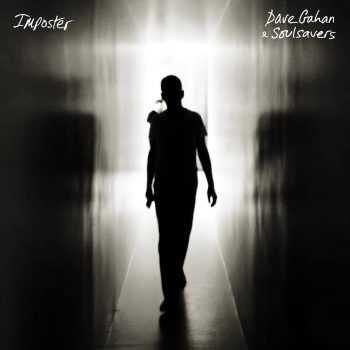The imprints of Bowie are deeply entwined within the voice and vision of the latest albums from Dave Gahan and Paul Weller, and through their late style they offer us illuminating ways to reflect on the arc and substance of our own lives as we begin this New Year in 2022.
written by David M. Buyze
Stream: ‘Imposter’ – Dave Gahan & Soulsavers
On a quintessential NYC autumn evening on Monday, September 11 in 2017, I saw Depeche Mode at Madison Square Garden during their Global Spirit tour, where Dave Gahan embodied the spirit of Bowie during DM’s transfixing cover of “Heroes” near the end of their set. It was the first time I had seen DM live, and also the first time I heard Gahan sing a cover — he himself would be the first to admit that Bowie can never really be covered, yet he performed a wonderful and empowering homage. Certainly, Bowie had been an immense source of inspiration that led a young Gahan to figure on his own sense of self in the universe. It is very fascinating to consider how these two small town kids would go on to dominate the world stages of music through their voices and visions in fostering immensely resilient forms of contemplation and catharsis on the human condition.

I was at this Depeche Mode concert with Sabina, and we had so utterly connected as they played the glorious “Never Let Me Down Again,” which led us back in time to our idealistic youth in taking our own ride throughout the passage of life. In my mind we never really left that idealistic place which always reappears as a permanent site for us to reconvene throughout the experiences and hidden corners of our lives. It was that way back in 1987 when DM’s Music for the Masses took ahold and shook America to its core, and it was in that exact year when we met for the first time in our lives — a girl and a boy that fell in love well before the time of pronouns in upstate NY in the late ’80s. In that cultural moment, certainly Bowie and The Smiths in the music realm were questioning more significant dilemmas about gender, being, and belonging than could be stated parenthetically in today’s vernacular.
In turn, Sabina and I have always remained idealistic despite the haters and naysayers that thought we were too idealistic because of being young and naive — where are all those dudes today? We took a ride as lovers, and now as best friends taking that ride, and we have always refused to come back down and put our feet on the ground as we have simultaneously retained and finessed our ideals onto the greater good of the world. Perhaps in some ways we remain to feel forever young despite the assuaging circumstances of the years, and that might well be the human condition, since if you can still rock it why settle into some mirage of how one is supposed to act, behave, and think in the latter years of life — which Bowie certainly fully embraced until his final days on planet earth.

Gahan undoubtedly figures in this perspective and approach to life as well, and on his latest collaboration with Soulsavers, the album Imposter is a beguiling experience, that deconstructs the Gahan we have known and loved across the ages through Depeche Mode, as he carves out his very own late style. It began as a rather strange experience to listen to Dave Gahan in this cover format as I wasn’t quite sure how to position myself as the listener after decades of Depeche Mode, and even within the other albums with Soulsavers, the original songs on those albums always bore a hubris that was still distinctly the Gahan of DM — which also echoed through Gahan’s enthralling work on his two entirely solo albums. Yet, if one bears in mind Depeche Mode covering Bowie’s “Heroes” it all makes more sense as to how Imposter arose.
In the early afternoon of Wednesday, October 17, 2007, Sabina and I went to Fingerprints Music in Long Beach, California on the release day of Dave Gahan’s solo album Hourglass and when we slid that pristine new CD into the Volkswagen’s player, the sounds of the overwhelming track “Saw Something” washed over us, and later that evening we soared within the vivacity of Hourglass throughout the night. As we were walking on the beach late the next morning, I was thinking that is there is something very particularly unique and weirdly suitable in hearing a new Gahan album amidst the calling of the ocean in California, and perhaps that is marked by the excesses that both Bowie and Gahan had lived through in Los Angeles. Those same excesses also enabled them to turn it around, or turn into one of the most remarkable periods of their respective careers, as with happened in Bowie’s career-defining and immensely innovative trilogy in Berlin, and with Gahan in Depeche Mode through Ultra, an often overlooked masterpiece.
Hourglass really was the embodiment of Gahan’s private emotion in a manner that was never really conveyed through the vehicle of DM amidst Martin L. Gore’s stupendous songwriting, aside from what has begun to appear in more recent albums such as through the remarkable song “Cover Me” on Spirit:
“The air is so cold here
Too cold to see
We have to take cover
Cover me
We appeared with the northern lights
Beyond these broken bars
I pictured us in another life
We’re all super stars”
Imposter builds on conveying Gahan’s private emotion in a different manner through how these twelve songs by varied artists have impacted his existence in providing solace amidst the contours and exigencies of life, and in this manner there is a foreboding degree of empowering intensity and swagger which is certainly entirely embodied in “Metal Heart,” the soulful introspection of “Lilac Wine,” through the heartwarming feeling of “Smile,” his pivotal positioning in thrusting Bob Dylan’s “Not Dark Yet” into another stratosphere that benefits how you can think about your own existence, and onto the beautiful lament of “Always on My Mind.”
As I listen to the shimmering “The Dark End of the Street,” I reflect on how Sabina and I have always found each other meeting at that exact place in creating our own sense of refuge from the world in dancing across and through the surfaces and frames of being in bending reality itself. Her and I have always been decidedly against the social and political trending definitions of how life should be lived, and wasn’t that really the point of all that began with Ziggy Stardust?
Gahan’s interpretation of Mark Lanegan’s “Strange Religion” also has a particularly uncanny resonance with my own register of being as it unfolds in a way that is really how it is, and not how the world understands it – religion in this metaphorical sense is shed from its societal constrictions, and rather concerns an intense connection with another person, a feeling of resonance and love in the darkness of your night, and of a bond that is culturally liberating in secular spheres. This could as well be seen as the mount and missive of Martin L. Gore’s vision of DM through his songwriting in extricating belief, faith, and doubt from any commonly held religious forms, and in rather deeply residing on what makes us most human as is certainly felt in the towering achievement of the album Songs of Faith and Devotion. Faith and devotion in this context are existential tropes about alienation, loneliness, desire, desperation, forgiveness, and love — in these emotions and states of being, there are traces of the indelible imprints of Bowie. His immortal imprints enable many of us to continue to live a meaningful, viable, and sometimes a phenomenal life through the salves of awareness that he was able to suture onto the web of disrupting and intersecting how being alive can be pondered in the solitude of your own private room, in the dark alleyways of your hidden consciousness, and on the boulevard of your social self.
What is most rewarding in Dave Gahan and Soulsavers’ Imposter is the overall immense sense of existential contemplation that is inspiring in enabling us to integrally understand Gahan in thoroughly new ways as to the songs that have been the most impactful on his very own being and those which he has carried with him throughout the experience of life. In turn, the epistemic imprint that he creates in this album can be refracted through the lens of our own experience in wonderful and convivial ways.
Stream: ‘An Orchestrated Songbook’ – Paul Weller

In the early ’80s, I was listening to Paul Weller through The Jam, but it was with Sabina when I first really heard Paul Weller in 1987 through the magnificent artistry that was created with The Style Council on their debut album Café Bleu — an LP that accompanied us throughout college in upstate NY, and on illustrious summer nights wandering through the captivating oscillations of Montréal from café to bar. We were ensconced in black as we embraced the nightlife of Montréal that made us feel as if we were living until the end of the world — the night of the sparkling sense of the city and the potentiality of being alive appeared as limitless. From 1987 till today, Paul Weller’s work has always been a constant delightful reminder of our own joyous youth and love for each other.
On Weller’s most recent album, An Orchestrated Songbook: Paul Weller With Jules Buckley & The BBC Symphony, he reimagines his most classic songs in creating his own sense of late style in a triumphant and utterly heartfelt manner as can be felt in retracing his youth in the powerful renditions of “My Ever Changing Moods” and “You’re the Best Thing” from Café Bleu, and through the burnished poignancy that is captured in “You Do Something to Me,” “English Rose,” and “Andromeda.” There is something that is so particularly special about these three songs which appear as those which could only be sung in this manner with a sense of perspective that accompanies the wealth of years in one’s curated late style.

Weller’s homage is captured in his song “Bowie” which paraphrases one of David Bowie’s most famous statements, “The truth is of course is that there is no journey. We are arriving and departing all at the same time,” which Weller articulates in the first two lines of his lyrics:
“Do you know there’s no journey?
We’re arriving and departing all the time
You were just mortal like me
God is only just a melody
Make the best of every moment
We are not evolving
Or going anywhere
And it’s fine
How can the world lose his name?
Everyone is bawling again
Burn the cross or leave it
Look above, you’ll see me
We miss you everywhere”
Undoubtedly, Bowie was of immense importance in Weller’s own life in figuring on this indelible dimension of loss that is felt everywhere, and through this perspective we are able to contemplate the preciousness and fragility of being and how this must be grasped in all its beauty in the midst of our own ephemerality in the passage of time.
It is a wonder to hear Gahan and Weller at this juncture in their careers, as they continue to explore new manners in which to provide expression to the gift of their musical visions that have accompanied our own happiness, sorrows, exhilaration, and ennui. The imprints of Bowie are deeply entwined within the voice and vision of the latest albums from Dave Gahan and Paul Weller, and through their late style they offer us illuminating ways to reflect on the arc and substance of our own lives as we begin this New Year in 2022.
“Something happened on the day he died
Spirit rose a metre then stepped aside
Somebody else took his place, and bravely cried
(I’m a blackstar, I’m a blackstar)
How many times does an angel fall?
How many people lie instead of talking tall?
He trod on sacred ground, he cried loud into the crowd”
– “Blackstar,” David Bowie
— —
In memory of David Bowie’s 75th birthday on 8 January 2022
— —
— —
David M. Buyze is a writer and professor on music and culture, in addition to writing and teaching on various humanistic dynamics involving such issues as race, religion, conflict, nationalism, and postcolonial paradigms. He has a PhD from University of Toronto, and is particularly interested in cultural, social, and political issues of marginalization and how existential, social, and national dimensions of liberation can occur within literary and artistic forms of expressions. He is very passionate about the power of music in enabling people to vibrantly experience the world and think about existence in transcendent ways. Connect with him on Instagram @davidbuyze, Twitter @BuyzeDavid, or via email: d.buyze@tcu.edu
— — — —

Connect to Paul Weller on
Facebook, Twitter, Instagram

Connect to Dave Gahan on
Facebook, Twitter, Instagram
Discover new music on Atwood Magazine
? © 2022








